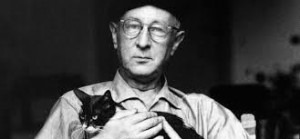 Bohuslav Martinů (1890-1959) always paid close attention to avant-garde cosmopolitan musical developments. Yet simultaneously he was acutely aware of his position as a composer of Czech national music. Ceaselessly working to “express the never-ending search for truth and the meaning of life,” Martinů composed in a variety of colorful styles and fluid forms. His characteristic musical language gradually builds small musical cells over insistent rhythms that ignore regular bar lines. Jazz harmonies happily mingle within an intricate network of counterpoint and one sculptor described his compositions as “carved out of marble.” In all, Martinů’s musical legacy consists of almost 400 compositions, ranging from choral works and operas to symphonies and a great deal of chamber music.
Bohuslav Martinů (1890-1959) always paid close attention to avant-garde cosmopolitan musical developments. Yet simultaneously he was acutely aware of his position as a composer of Czech national music. Ceaselessly working to “express the never-ending search for truth and the meaning of life,” Martinů composed in a variety of colorful styles and fluid forms. His characteristic musical language gradually builds small musical cells over insistent rhythms that ignore regular bar lines. Jazz harmonies happily mingle within an intricate network of counterpoint and one sculptor described his compositions as “carved out of marble.” In all, Martinů’s musical legacy consists of almost 400 compositions, ranging from choral works and operas to symphonies and a great deal of chamber music.
“The artist is always searching for the meaning of life, his own and that of mankind, searching for the truth,” he once wrote. “A system of uncertainty has entered our daily life. The pressures of mechanization and uniformity to which it is subject calls for protest and the artist has only one means of expressing this, by music.” Written during the last years of his life, the oboe concerto emerged in 1955 as a request from Jiří Tancibudek, an eminent Czech player who had settled in Australia. The project was financially underwritten by the Sydney Daily Telegraph in celebration of the 1956 Olympic Games in Melbourne. As such the first performance took place in August 1956 in Sydney, and the first recording was issued in 1962. With it’s characteristic harmonic progressions and syncopated rhythms, the three movements present sharply contrasted materials. A bright and jovial opening movement eventually established a mood of expressive lyricism that also informs the slow movement. The piano, which plays in important part in many of Martinů’s orchestral works, initiates the final movement. Lyricism alternates with jollier episodes and carries the work to a happy and virtuoso conclusion.
Bohuslav Martinů: Oboe Concerto H.353
You May Also Like
- Unsung Concertos
Louis Spohr: Clarinet Concerto No. 1 in C minor, Op. 26 Louis Spohr (1784-1859), actually born Ludwig Spohr in Braunschweig, was a German composer, violinist and conductor. - Unsung Concertos
Thomas Tellefsen: Piano Concerto No. 2 Like many young and talented Nordic musicians, Thomas Dyke Acland Tellefsen (1823-1874) was drawn to the city of Paris. - Unsung Concertos
Alexander Scriabin: Piano Concerto in F-Sharp Minor, Op. 20 During his lifetime, Scriabin was primarily known as a pianist, with Igor Stravinsky marveling at his phenomenal playing. - Unsung Concertos
Jacques Ibert: Flute Concerto If you think that all classical music has to be deadly serious, let me introduce you to Jacques Ibert (1890-1962). Ibert was a graduate from the Paris Conservatoire.
More Anecdotes
-
 Haydn’s “Ox Minuet” A butcher, his daughter's wedding, and a composer's unexpected reward
Haydn’s “Ox Minuet” A butcher, his daughter's wedding, and a composer's unexpected reward - Composers in the Courtroom
Lully versus Guichard Louis XIV's favorite musician had a dark side! - Food for Thought
Mealtime with Leopold Mozart Did you know Leopold Mozart was as critical of food as he was of music? - Movers and Shakers
Giulio Gatti-Casazza (1869-1940) Discover how Giulio Gatti-Casazza transformed the Metropolitan Opera!

